
Best of 2017 lists continue, with choices from Slate’s Laura Miller, the New York Times critics, the Los Angeles Times critics at large, and NPR’s Maureen Corrigan, to name a few. The Albertine Prize finalists include Christine Angot’s Incest, Matthias Enard’s Compass, Anne Garreta’s Not One Day, Edouard Louis’s The End of Eddy, and Alain Mabanckou’s Black Moses. This week, members of the National Book Critics Circle board are compiling longlists to distill to shortlists—30 finalists in all—at their January 20, 2018 board meeting.
Pentagon Papers whistleblower Daniel Ellsberg has new revelations about the nuclear buildup, Virtual Reality pioneer Jaron Lanier’s memoir contains “artful, numinous writing” about technology, Fiona Mozley’s debut was shortlisted for the Man Booker Prize, Elizabeth Berg’s latest is “a novel for these contentious times,” and “Fellini’s ‘La Dolce Vita’ gets a 21st century makeover” in Pino Corrias’s first novel.
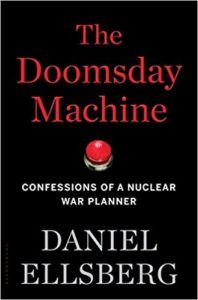
Daniel Ellsberg, The Doomsday Machine
The whistleblower who revealed the extent of U.S. involvement in the Vietnam War in 1971, also was an eye witness to the development of the nuclear age, with its early crises (Korea, Berlin, Quemoy, Lebanon and Suez). His memoir includes previously undisclosed documents about those years of nuclear buildup. “Tragically, I believe that nothing has fundamentally changed,” he writes.
“Daniel Ellsberg gained notoriety in the early 1970s for leaking the Pentagon Papers, the Defense Department’s top-secret history of the Vietnam War, and then for outspokenly protesting the war and the government’s secrecy which sustained it,” writes Fred Kaplan (Slate). “Yet few, then or now, are aware that he spent much of the previous decade immersed in highly classified studies of the U.S. nuclear-war machine: how it works, who can launch an attack, and how much devastation it can wreak if someone ever pushed the button. The Doomsday Machine is his long-gestating memoir of those times and the years since, and it is one of the best books ever written on the subject—certainly the most honest and revealing account by an insider who plunged deep into the nuclear rabbit hole’s mad logic and came out the other side.”
“The Doomsday Machine is being published at an alarmingly relevant moment, as North Korea is seeking the capability to target the United States with nuclear missiles, and an unpredictable president, Donald Trump, has countered with threats of ‘fire and fury,’” notes Andrew Rice (New York magazine). “Experts on North Korea say that the risk of a nuclear exchange is higher than it has been in recent memory.”
Kevin Canfield (San Francisco Chronicle) notes, “To those yearning for a preemptive attack to ‘decapitate’ North Korean leadership, Ellsberg has some words of caution. Ostensibly designed to avert a nuclear exchange, such an offensive would probably trigger one, he says, because Pyongyang almost certainly has a ‘dead hand’ system that, in the event of Kim Jong Un’s demise, would prompt a ‘full-scale launching of their ready forces.’”
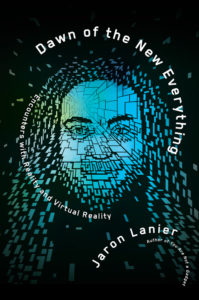
Jaron Lanier, Dawn of the New Everything: Encounters with Reality and Virtual Reality
In a memoir/meditation, the computer scientist and “virtual reality” pioneer discusses the current and future complexities of technology and how it shapes our lives.
Annalee Newitz (NPR) leads off:
With virtual reality rigs like the Oculus finally finding their way into people’s homes, it’s a perfect time to look back on the birth of a technology that almost didn’t exist. Dawn of the New Everything is techie guru Jaron Lanier’s attempt to explain the origins of VR, both technically and philosophically. He’s the perfect person to tell this story, too: Lanier founded a company called VPL Research in the 1980s that sold the first VR development kits to scientists, government contractors, and Hollywood studios.
Emily Parker (Washington Post) notes, “In his 22nd definition of virtual reality (yes, they are numbered), Lanier describes it as a ‘preview of what reality might be like when technology gets better someday.’ This description contains both a promise and a warning. Will virtual reality eventually become so life-like that it threatens to supplant reality? If you could virtually go to a concert, a sporting event or even the French countryside, why would you bother leaving your house?”
“A breezy read Dawn of the New Everything is not,” points out Stephen Phillips (San Francisco Chronicle). “Baggy, unkempt and idiosyncratic as its author, it pulses with kaleidoscopic insight, recondite science and deeply felt opinions—a rejoinder to singularity-struck ‘digital supremacist[s].’ It also contains some of the more artful, numinous writing you’ll find on technology.”
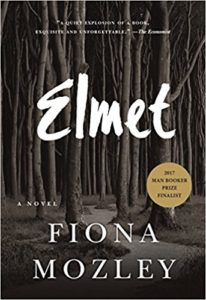
Fiona Mozley, Elmet
This first novel set in West Yorkshire was shortlisted for the 2017 Man Booker Prize. Its themes of class struggle and sexual violence are timely.
“Mozley’s instantaneous success . . . is a response to the stylish intensity of her work, which boldly winds multiple genres into a rich spinning top of a tale,” concludes the starred Kirkus Review.
“There’s a lot of death-struggle—and a corpse or two or a few—in 29-year-old Fiona Mozley’s debut novel, a lyrical and mythic work,” writes John Williams (New York Times Book Review).
Naomi Frisby (Ozy) notes, “It’s a triumph of Mozley’s writing that she’s able to give these working-class characters their own voices without patronizing them. Also remarkable is the novel’s depiction of Cathy’s struggle with the sexual violence enacted on her. From the squaddy who brushes her thigh to the boy who puts his hand up her top and calls her a slut to two attempted rapes, the violence faced by Cathy becomes entwined with the struggle between Price and her father. This highlights the abuse of power and ties it to the theme of class. Cathy’s responses to these incidents shape who she becomes, coming to understand the language of violence and how she can use it . . . ”
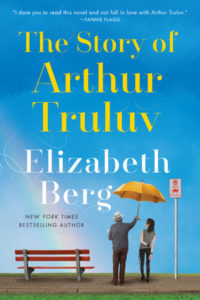
Elizabeth Berg, The Story of Arthur Truluv
After 28 books, Berg still found herself crying after reading the final pages of her new novel to her partner, she tells the Boston Globe’s Kate Tuttle. “I think the book is a lot larger than I thought it was. Or at least for me it is. It speaks to the need for human connection and how we really are dependent upon each other, and we really are all connected, and ought to be able to do a better job at loving each other.”
Tara Block (PopSugar) calls the novel “an emotional read about loss, love, and second chances.”
“The Story of Arthur Truluv is sweet and light and completely free of politics,” writes Trine Tsouderos (Chicago Tribune). “It’s about love, hope and second chances. Miraculously, Berg’s slim story—it runs just over 200 pages—manages to settle into these themes without being sugary . . . ”
Patty Rhule (USA Today) concludes, “Truluv is a novel for these contentious times. We could all use a bit of Arthur’s ego-free understanding and forgiveness of fellow human beings. When the inevitable happens in this heartwarming novel, good luck convincing yourself that the lump in your throat is just a sympathy response to one of Gordon’s hairballs.”
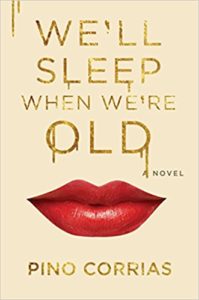
Pino Corrias, We’ll Sleep When We’re Old
Oscar Martello, a film executive who rose from poverty, his usual collaborator, and an actress they both are drawn to, make up the triangle in this thriller set in Rome.
“Fellini’s ‘La Dolce Vita’ gets a 21st century makeover in this salacious novel by an Italian journalist set in the decadent movie world of Rome,” writes Tom Beer (Newsday).
“Corrias, a Rome-based journalist and TV producer, knows this world, with its dark edges and dramatic vendettas, its paths reversing so the players go up or down, down, down,” I note in my BBC Culture column.
Kirkus Reviews calls Corrias’s first novel “an exuberantly vulgar takedown of Rome’s media world as personified by the supremely coarse and corrupt figure of Martello.”

